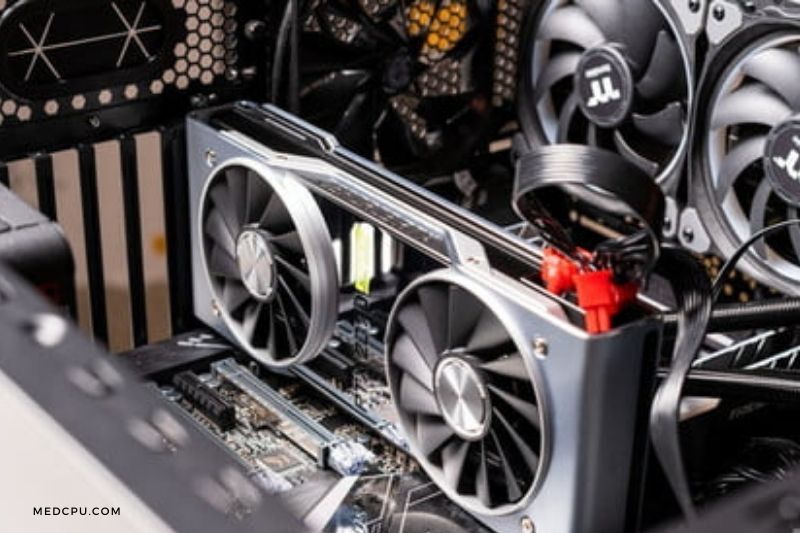In an effort to provide consumers with a choice when it comes to purchasing their graphics card, Nvidia and AMD both released two new GPU models: 1080 ti vs 5700 xt.
These high-end cards represent the most powerful options in their respective product categories and, with this introduction. But which one is the right choice for you? Read on our in-depth comparison to find out!
NVIDIA GeForce GTX 1080 Ti vs AMD Radeon RX 5700 XT Comparison
Dimensions
It is essential to consider the dimensions of your GPU to make sure it fits your build.
These are the dimensions for each GPU.
Nvidia GTX 1080 Ti:
- Length: 10.5″
- Width – 2 Slots
AMD RX 5700XT:
- Length: 10.7″
- Width – 2 slots
These graphics cards have very little in common. The Nvidia GTX 1080Ti may be a better choice if you need a smaller graphics card.
Both use two slots, and both require a power connection of 1 x 6-pin or 1 x 8.
The Nvidia GPU is outperformed by AMD GPU when it comes to the PCIe interface. Nvidia uses 3.0 x16 PCIe, while AMD uses 4.0 x16 PCIe. The AMD GPU is the best option if you want the most up-to-date interface. PCIe 3.0 works well, but PCIe 4.0 has better bandwidth and is more future-proof.
Architecture
Let’s have a look at each GPU’s clock speeds:
Nvidia GTX 1080 Ti:
- Base Clock – 1481MHz
- Boost Clock – 1600MHz
AMD RX 5700XT:
- Base Clock – 1605MHz
- Boost Clock – 1905MHz
Nvidia’s flagship series 10 model, the Nvidia GTX1080 Ti, is its flagship model. It is built with Nvidia Pascal architecture which is the most powerful GPU architecture on the market. It offers 3X more performance than Nvidia’s older GPU. It supports next-generation VR.
DirectX 12 is supported by Nvidia Pascal, which offers some of the most powerful gaming experiences. It is much more efficient than the previous architecture in terms of power efficiency.
AMD RDNA Architecture is used in the AMD RX5700 XT. This is a significant improvement over previous AMD models. RDNA supports next-gen gaming. It offers 1.25 times more performance than its older 14nm models.
This GPU is highly efficient, and AMD has done well with it. This architecture marks a significant leap forward for the company and brings them closer to Nvidia. It’s VR-ready, and the performance per watt is 1.5x higher than its predecessors.
Cooling

Nvidia GTX 1080 Ti features cooling vents that allow air to circulate the GPU. This will prevent the card’s overheating. This will not allow the GPU to reach its maximum temperature of 91.
We recommend buying an additional cooling system if you plan to overclock your graphics card. This will prevent your GPU from overheating while it is being overclocked.
Nvidia GTX1080 Ti’s overall power consumption is 250W. This compares to the AMD RX5700 XT’s 225W. The TDP is comparable to the 1080 Ti’s, but it is less than the 5700XT. If you’re looking to overclock, the 5700XT has a lower total TDP. The AMD RX5700 XT uses a similar blower cooling system to the 1080 Ti.
Resolutions/FPS
It is essential to know your GPU’s resolution and fps settings, especially if your goal is to future-proof your graphics card to display the resolution of a 4K screen.
Maximum resolution for Nvidia GTX1080 Ti is 7680×4320, and for AMD RX5700 XT it is 1440p. Both can run at 4K resolution if you wish.
It is quite even when looking at the fps benchmarks. When Minecraft was tested at 1080p, the GTX 1080 Ti had 250fps. This is in contrast to RX5700 XT’s 215fps. GTA V showed that the AMD GPU had 117fps at 1080p, compared to Nvidia’s 101fps.
The overall performance of the Nvidia is still superior, with 28% more fps. Its MRender was 16% higher. This is a small difference, but it will make a big difference in your gameplay. The GTX 1080 Ti’s MRender is 134 fps, while the RX 5700 XT’s MRender is 116 fps.
Ray tracing
Ray tracing is essential if you want the best out of your GPU for lighting and shading.
We recommend the Nvidia GTX1080 Ti if ray tracing features are important to you.
Even though the AMD RX 5700 XT is a newer model, it does not employ ray tracing. The lighting effects in the game are still excellent.
Ray tracing is something you should consider if you are a gamer, such as Metro Exodus or Call of Duty.
VRAM
It is crucial to have a VRAM for your GPU. This allows your GPU to render graphics faster. This is especially important if your AAA games are played.
It is recommended that you have at least 6GB to run modern games at 1080p resolution with high graphics. For games at 1440p resolution, expect to need between 8GB to 12GB VRAM.
Nvidia GTX1080 Ti comes with 11GB GDDR5X, while the AMD RX5700 XT has 8GB GDDR6 RAM. The Memory speed of the AMD is slightly faster at 14Gbps, compared to the Nvidia’s 11.
Nvidia’s GPU uses video memory with a lower specification than the AMD. Nvidia uses GDDR5X, while the AMD GPU uses GDDR6. The AMD card is more future-proofed because it’s a newer model with the most current memory specs.
Check out our comparison between Nvidia RTX 2080 Ti vs 2080 Super: https://medcpu.com/2080-ti-vs-2080-super/
Conclusion
When it comes to choosing between NVIDIA and AMD graphics cards, it really is a personal preference. Gamers who like to push their systems to the max often choose the NVIDIA GeForce GTX 1080 Ti, but those with a lower budget can opt for the AMD Radeon RX 5700 XT. Each type of video card has its own strengths.
I prefer NVIDIA cards because they tend to be more future-proof than AMD GPUs, but others prefer the power of the RX 5700 XT.
Video:

Eyal Ephrat serves as the co-founder and CEO of medCPU.com, where technology is making significant strides in the field of medicine. Through his experience in purchasing PC and laptop equipment and various other tech products, Eyal Ephrat contributes valuable insights to medCPU’s mission.
